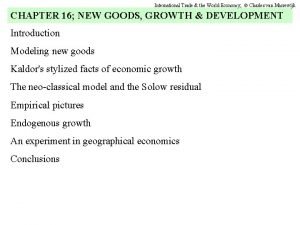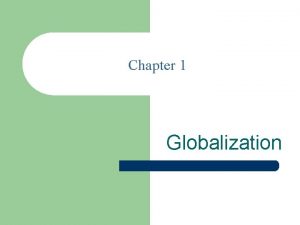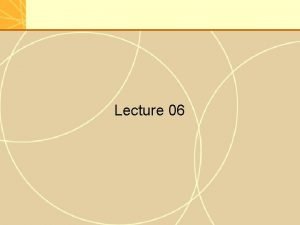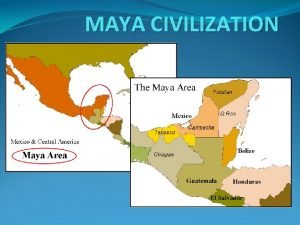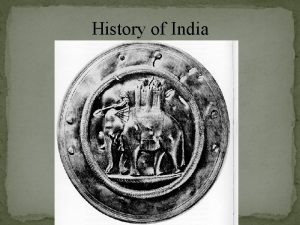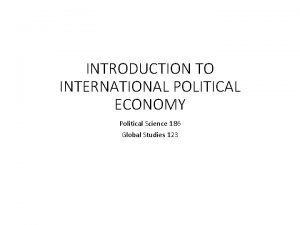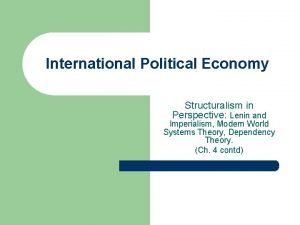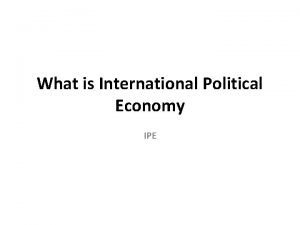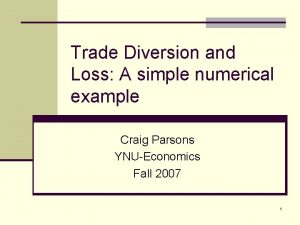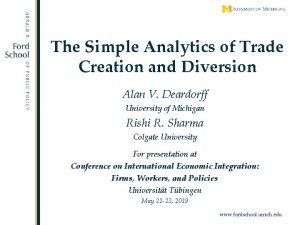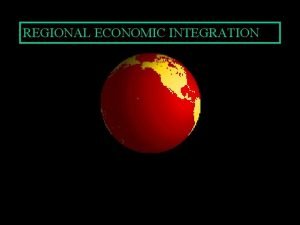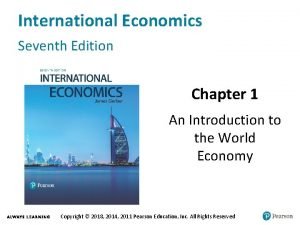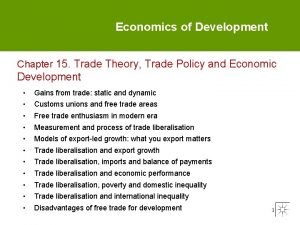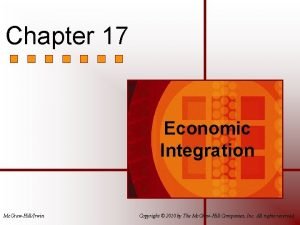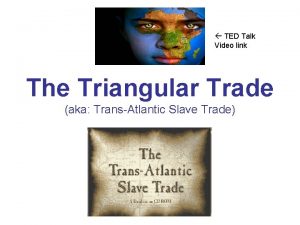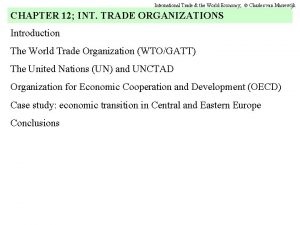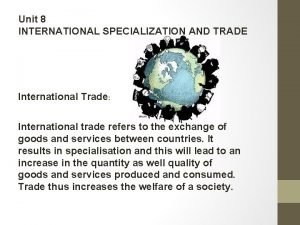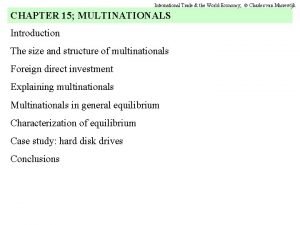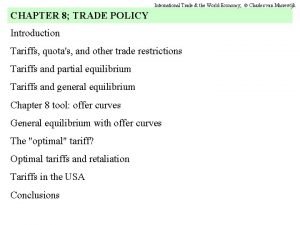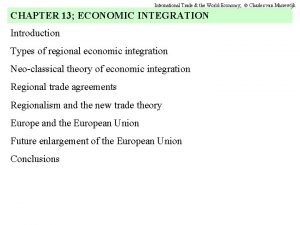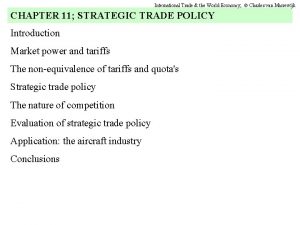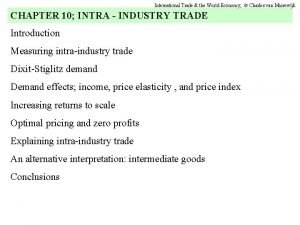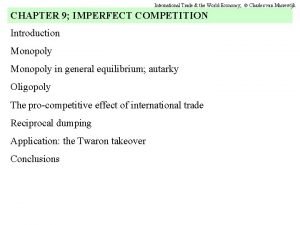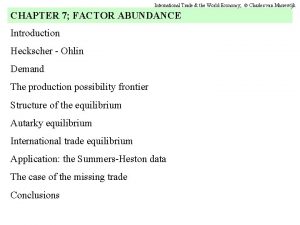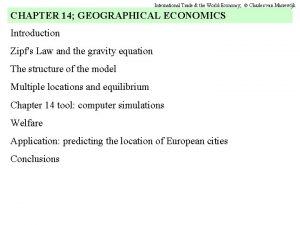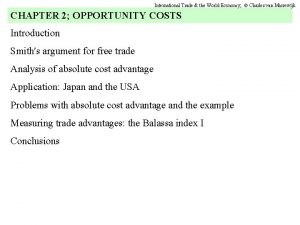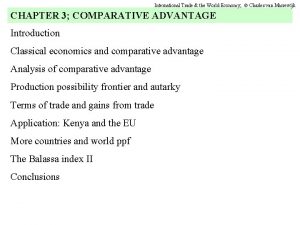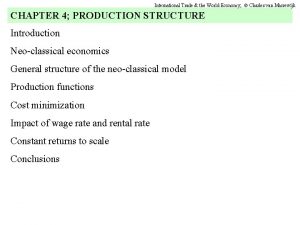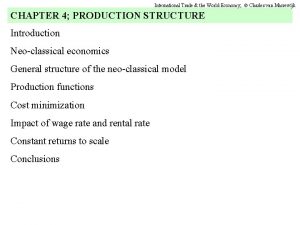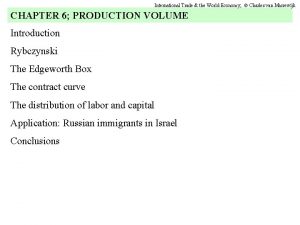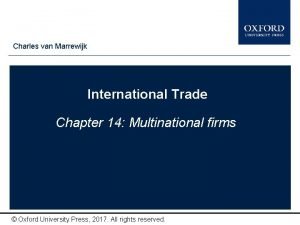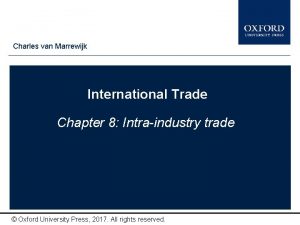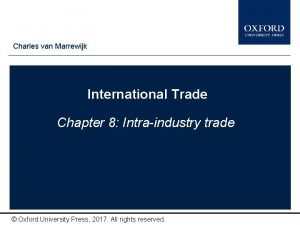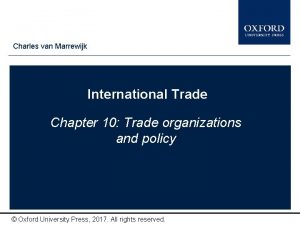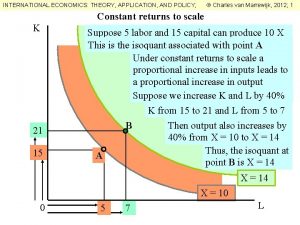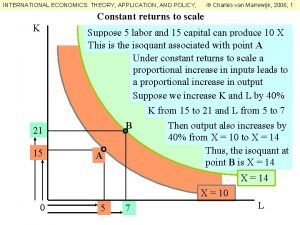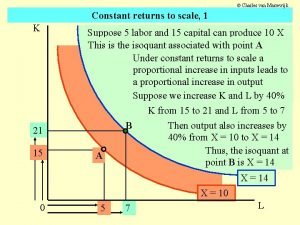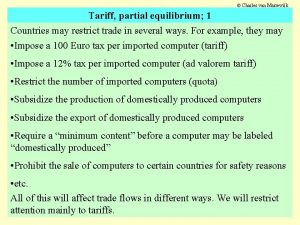International Trade the World Economy Charles van Marrewijk
























- Slides: 24

International Trade & the World Economy; Charles van Marrewijk CHAPTER 5; FACTOR PRICES Introduction Factor price equalization The Lerner diagram From factor prices to final goods prices From final goods prices to factor prices Stolper - Samuelson Graphical analysis The magnification effect Application: globalization, low wages, and unemployment Conclusions


International Trade & the World Economy; Charles van Marrewijk CHAPTER 5; FACTOR PRICES Introduction Factor price equalization The Lerner diagram From factor prices to final goods prices From final goods prices to factor prices Stolper - Samuelson Graphical analysis The magnification effect Application: globalization, low wages, and unemployment Conclusions

International Trade & the World Economy; Charles van Marrewijk Introduction Harry Johnson (1923 -1977)

International Trade & the World Economy; Charles van Marrewijk CHAPTER 5; FACTOR PRICES Introduction Factor price equalization The Lerner diagram From factor prices to final goods prices From final goods prices to factor prices Stolper - Samuelson Graphical analysis The magnification effect Application: globalization, low wages, and unemployment Conclusions

International Trade & the World Economy; Charles van Marrewijk Factor price equalization (FPE) In a neo-classical framework with 2 final goods and 2 factors of production, there is a one-to-one correspondence between the prices of the final goods and the prices of the factors of production, provided both goods are produced. This implies: • factor rewards known derive prices of final goods • prices of final goods known derive factor rewards Corollary In a neo-classical framework with 2 countries, 2 final goods, and 2 factors of production, international trade of the final goods, which equalizes the prices of these goods in the two nations, also leads to an equalization of the rewards of the factors of production in the two nations, provided both final goods are produced in both nations and the state of technology in the two nations is the same.

International Trade & the World Economy; Charles van Marrewijk CHAPTER 5; FACTOR PRICES Introduction Factor price equalization The Lerner diagram From factor prices to final goods prices From final goods prices to factor prices Stolper - Samuelson Graphical analysis The magnification effect Application: globalization, low wages, and unemployment Conclusions

International Trade & the World Economy; Charles van Marrewijk The Lerner diagram Unit value isocost line: Unit value isoquants:

International Trade & the World Economy; Charles van Marrewijk CHAPTER 5; FACTOR PRICES Introduction Factor price equalization The Lerner diagram From factor prices to final goods prices From final goods prices to factor prices Stolper - Samuelson Graphical analysis The magnification effect Application: globalization, low wages, and unemployment Conclusions

International Trade & the World Economy; Charles van Marrewijk From factor prices to final goods prices Knowing the prices of inputs w and r gives the unit cost line There is only one isoquant for good M which touches it K This determines exactly the price pm Similarly, there is only one isoquant for M = 1/pm good F which touches the isocost line; this determines exactly the price pf 1/r B C F = 1/pf 1/w L

International Trade & the World Economy; Charles van Marrewijk CHAPTER 5; FACTOR PRICES Introduction Factor price equalization The Lerner diagram From factor prices to final goods prices From final goods prices to factor prices Stolper - Samuelson Graphical analysis The magnification effect Application: globalization, low wages, and unemployment Conclusions

International Trade & the World Economy; Charles van Marrewijk From final goods prices to factor prices Given the prices of final goods pm and pf the unit value isoquants are determined exactly. They are drawn here in the figure There is only one isocost line which touches these two isoquants K 1/r This determines exactly the values 1/r and 1/w M = 1/pm This implies that if trade between two countries equalizes the prices of final goods and these two countries have identical CRS production functions, then the reward to factors of production B w and r are also equalized (FPE) C F = 1/pf 1/w L

International Trade & the World Economy; Charles van Marrewijk CHAPTER 5; FACTOR PRICES Introduction Factor price equalization The Lerner diagram From factor prices to final goods prices From final goods prices to factor prices Stolper - Samuelson Graphical analysis The magnification effect Application: globalization, low wages, and unemployment Conclusions

International Trade & the World Economy; Charles van Marrewijk Stolper - Samuelson proposition In a neo-classical framework with 2 final goods (both produced) and 2 factors of production, an increase in the price of a final good • increases the factor price of the input used intensively in the production of that good, and • reduces the factor price of the other input. So if e. g. the production of manufactures is capital intensive and the price of manufactures rises: • the rental rate rises and the wage rate falls.

International Trade & the World Economy; Charles van Marrewijk CHAPTER 5; FACTOR PRICES Introduction Factor price equalization The Lerner diagram From factor prices to final goods prices From final goods prices to factor prices Stolper - Samuelson Graphical analysis The magnification effect Application: globalization, low wages, and unemployment Conclusions

International Trade & the World Economy; Charles van Marrewijk Graphical analysis An increase in the price of manufactures increases the rental rate and reduces the wage rate

International Trade & the World Economy; Charles van Marrewijk CHAPTER 5; FACTOR PRICES Introduction Factor price equalization The Lerner diagram From factor prices to final goods prices From final goods prices to factor prices Stolper - Samuelson Graphical analysis The magnification effect Application: globalization, low wages, and unemployment Conclusions

International Trade & the World Economy; Charles van Marrewijk The magnification effect Jones magnification effect In a neo-classical framework with 2 final goods, manufactures M and food F, and 2 factors of production, capital K and labor L, with factor rewards r and w, respectively, changes in the final goods prices are magnified in the factor rewards. If we denote relative changes by ~ and assume that the production of manufactures is relatively capital intensive, the following relationships hold: • if then

International Trade & the World Economy; Charles van Marrewijk CHAPTER 5; FACTOR PRICES Introduction Factor price equalization The Lerner diagram From factor prices to final goods prices From final goods prices to factor prices Stolper - Samuelson Graphical analysis The magnification effect Application: globalization, low wages, and unemployment Conclusions

International Trade & the World Economy; Charles van Marrewijk Application: globalization, low wages, and unemployment The Stolper-Samuelson result was at the center of the ‘globalization’ debate; rising wage inequality in USA, rising unemployment in EU

International Trade & the World Economy; Charles van Marrewijk Application: globalization, low wages, and unemployment Argument: rising imports from low-wage unskilled-labor countries reduces unskilled-labor intensive final goods price, thus reducing wage rate for unskilled workers (USA) or increasing unemployment (EU)

International Trade & the World Economy; Charles van Marrewijk CHAPTER 5; FACTOR PRICES Introduction Factor price equalization The Lerner diagram From factor prices to final goods prices From final goods prices to factor prices Stolper - Samuelson Graphical analysis The magnification effect Application: globalization, low wages, and unemployment Conclusions

International Trade & the World Economy; Charles van Marrewijk Conclusions In the neo-classical model: • one-to-one correspondence between final goods prices and factor rewards • free trade same final goods prices same factor rewards (FPE) • price increase of a final good raises reward to input used intensively in the production of that good, reduces reward to other input (St-Sa) • changes of final goods prices magnified in factor prices (Jones magnification) • application in globalization debate • natural-resource intensive manufacturing exports haphazardly spread across the globe

International Trade & the World Economy; Charles van Marrewijk Conclusions Natural-resource intensive man. ; share of exports (%), 1998; Source: ITC
 Charles van marrewijk
Charles van marrewijk Athens and sparta were both
Athens and sparta were both The changing world output and world trade picture
The changing world output and world trade picture The changing world output and world trade picture
The changing world output and world trade picture Maya economy and trade
Maya economy and trade Indus valley civilization trade and economy
Indus valley civilization trade and economy The rights of trade unions
The rights of trade unions Ancient india natural resources
Ancient india natural resources Charles luther manson
Charles luther manson International political economy
International political economy Structuralism in international political economy
Structuralism in international political economy International political economy
International political economy Trade diversion and trade creation
Trade diversion and trade creation Umich
Umich Trade diversion and trade creation
Trade diversion and trade creation The trade in the trade-to-gdp ratio
The trade in the trade-to-gdp ratio Fair trade not free trade
Fair trade not free trade Trade diversion and trade creation
Trade diversion and trade creation Liner shipping and tramp shipping
Liner shipping and tramp shipping Triangular trade video
Triangular trade video Fascist corporatist economy ap world
Fascist corporatist economy ap world The economy economics for a changing world
The economy economics for a changing world World-economy
World-economy The economy: economics for a changing world
The economy: economics for a changing world International specialization and trade
International specialization and trade
